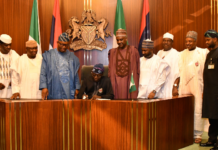As fears mount over the newly identified coronavirus variant Omicron, governments around the world are scrambling to protect their citizens from a potential outbreak. However, it is not the case in Nigeria where the Federal Government has remained silent.
The new mutation, which is potentially more transmissible, was first discovered in South Africa and has since been detected in the United Kingdom, Germany, Israel, Italy, the Czech Republic and Hong Kong. Omicron is the fifth variant of discovered and named since the outbreak of the pandemic about two years ago. Countries are taking precautionary steps.
Israel is banning all foreigners from entering the country in response to Omicron fears, authorities announced Saturday. The ban, pending government approval, is expected to last two weeks. Israelis returning from a country on the red list, which includes countries in southern Africa, will be required to isolate for seven days in a designated hotel.
There are seven suspected cases of the variant in Israel, in addition to one confirmed case found in a person returning from Malawi, its Health Ministry said.
Australia is urgently testing travelers who arrived in Sydney from southern Africa after they tested positive for Covid-19, the New South Wales Health Ministry said in a statement Sunday.
“Urgent genomic sequencing is underway to determine if they have been infected by the new Omicron B.1.1.529 variant of concern,” the statement said. Other passengers on the flight may be considered a close contact and are being asked to get tested immediately, it added.
Australia has banned the entry of foreigners who have traveled to nine southern African countries in the past 14 days, including South Africa, Lesotho, Botswana, and Zimbabwe.
Meanwhile, South Korea has imposed restrictions on travelers from eight southern African countries, its Disease Control and Prevention Agency announced Saturday.
Foreign nationals traveling from South Africa, Botswana, Namibia, Zimbabwe, Lesotho, Eswatini, Malawi and Mozambique are banned from entering South Korea, the agency said. The issuing of visas for nationals from those countries has been suspended until further notice, it added.
Korean nationals entering from those countries must quarantine in a government-designated facility for 10 days.
Europe is also frantically imposing travel bans and scrambling to ramp up its coronavirus sequencing abilities after several countries on the continent reported suspected Omicron cases.
By Saturday afternoon, two cases were confirmed in the UK, two others in Germany and one in Italy. Dozens more are suspected in the Netherlands and the Czech Republic. The top infectious disease expert in the United States, Dr. Anthony Fauci, also said it was possible the new variant was already in his country but was yet to be detected.
UK’s Secretary of State for Health Sajid Javid said the two cases detected in the UK were linked to travel to southern Africa, the region where the Omicron variant was first detected.
“These individuals are self-isolating with their households while further testing and contact tracing is underway,” he added.
The World Health Organization (WHO) said late on Friday that early evidence suggest the Omicron variant, first identified in South Africa, could pose an increased risk of reinfection and said that some of the mutations detected on the variant were concerning.
WHO designated the Omicron a “variant of concern” on Friday, it stressed that more research is needed to determine whether the variant is more contagious, whether it causes more severe disease, and whether it could evade vaccines.
“This variant has a large number of mutations and some of these mutations have some worrying characteristics,” Maria Van Kerkhove, WHO’s technical lead for Covid-19, said in a statement on Friday.
The discovery of the new variant has sparked fears around the world. A number of countries have imposed travel bans and the global markets plunged.
Nigerian authorities silent
However, in Nigeria, the Federal Government is yet to issue a travel advisory or even acknowledge the new variant. The country, though, has recorded steady decline in new cases.
On Sunday morning, the Nigeria Centre for Disease Control (NCDC) announced 58 new coronavirus cases, taking the country’s total infection to 213,982. Of that number, 207,184 patients have been released while 2,975 succumbed to the virus. This was the third succesive day it recorded below 100 new cases.
Nigeria had registered about four Covid-19 strains. In June 2021, the Federal Government added travellers from South Africa to the list of countries banned from flying into Nigeria due to the Delta variant which spread fast in the country. But last month, the FG removed the African nation as well as Brazil and Turkey from the list of restricted countries with an embargo placed on inbound flights.
However, a renowned virologist and Chairman, Expert Review Committee on Covid-19, Prof Oyewale Tomori, has called on the Federal Government to be swift in its emergency response to the recently-discovered B.1.1.529 strain.
Tomori said, “Given our porous border and free for all poorly guarded points of entry, plus uncoordinated genetic sequencing practice, efficient surveillance backed by laboratory support puts South Africa way ahead of us. Africa’s biggest economy recently began flights to the United Emirates.
“Given our state of performance, it will probably take months after the new variant case has arrived in Nigeria before we detect it. By then, it would have spread all over the country so why should we not put them on alert?
“At this point, we need to keep the PSC on, as long as COVID is on, improve and upgrade genetic sequencing, get our points of entry up and doing and not a point of escape of variants into Nigeria, improve contact tracing, test people on arrival and do an efficient and effective contact tracing and follow up.”











